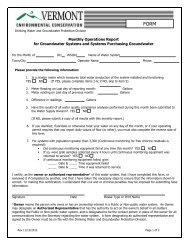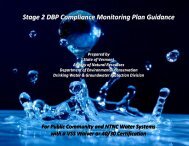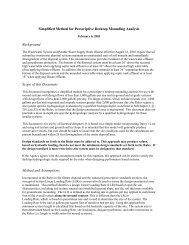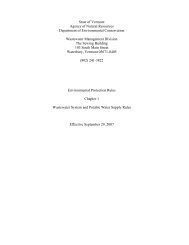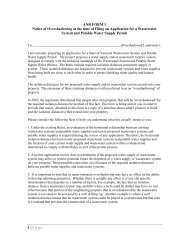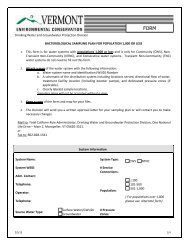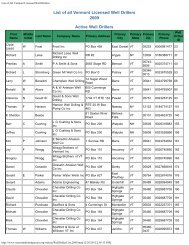Conversion of Single Family Residences from Seasonal to Year ...
Conversion of Single Family Residences from Seasonal to Year ...
Conversion of Single Family Residences from Seasonal to Year ...
Create successful ePaper yourself
Turn your PDF publications into a flip-book with our unique Google optimized e-Paper software.
Guidance<br />
<strong>Conversion</strong> <strong>of</strong> <strong>Single</strong> <strong>Family</strong> <strong>Residences</strong> <strong>from</strong> <strong>Seasonal</strong> <strong>to</strong> <strong>Year</strong>-round Use for <strong>Residences</strong><br />
that are Exempt <strong>from</strong> the Wastewater System and Potable Water Supply Rules until July 1,<br />
2007<br />
ISSUOOSJf;hW~tJ75 ~<br />
On July 1,2007, a number <strong>of</strong> single-family residences in the state will be subject <strong>to</strong><br />
the requirements <strong>of</strong> the Wastewater System and Potable Water Supply Rules (Rules) for the<br />
first time. These residences are currently exempt under various provisions <strong>of</strong> the Rules. One<br />
<strong>of</strong> the requirements that will apply is that converting a residence <strong>from</strong> seasonal <strong>to</strong> year-round<br />
use will require a permit under the Rules. This document provides guidance <strong>to</strong> owners <strong>of</strong><br />
certain exempt single-family residences on what must happen and what steps must be taken<br />
before July 1, 2007 for the residence <strong>to</strong> be considered a year-round residence.<br />
A single family residence will be considered <strong>to</strong> be a year-round residence when it<br />
meets the requirements for one or more exemptions under §1-403(a) <strong>of</strong> the Rules and has<br />
been occupied for at least 180 days per year as a primary residence. The building need not<br />
be owner occupied. A building that has met these requirements, but has subsequently been<br />
occupied for shorter periods <strong>of</strong> time and/or not as a primary residence, shall maintain its<br />
status as a year-round residence unless there has been specific actions taken <strong>to</strong> limit the use<br />
<strong>to</strong> seasonal use or <strong>to</strong> convert the building <strong>to</strong> other than use as a single family residence.<br />
Examples <strong>of</strong> such limitation include, but are not limited <strong>to</strong>: a deed restriction, legal<br />
agreement with the municipality in which the building is located <strong>to</strong> limit or convert the use,<br />
or a building deteriorated <strong>to</strong> the point where it no longer meets the requirements for being<br />
improved that remains unimproved for a period beyond that allowed for reconstruction <strong>of</strong><br />
buildings destroyed or voluntarily removed.<br />
In addition <strong>to</strong> being considered as a year-round residence based on actual occupancy<br />
as described above, a single-family residence will be considered <strong>to</strong> be a year-round residence<br />
in the following instances:<br />
A. The single family residence is subject <strong>to</strong> a permit under these Rules, unless the<br />
permit limits the use, the application on which the permit is based states that<br />
the application is not for year-round use, or the supporting information<br />
submitted as part <strong>of</strong> the application specifically indicates that the residence<br />
does not qualify for year-round use;<br />
B. The single family residence is exempt <strong>from</strong> these Rules, but was not occupied<br />
as a year-round residence prior <strong>to</strong> July 1, 2007, provided the residence was<br />
constructed pursuant <strong>to</strong> a municipal ordinance or zoning by-law that requires<br />
the application <strong>of</strong> specific technical standards for the design and construction<br />
<strong>of</strong> wastewater systems unless the municipal permit limits the use, the<br />
1
application on which the pennit is based states that the application is not for<br />
year-round use, or the supporting infonnation submitted as part <strong>of</strong> the<br />
application specifically indicates that the residence does not qualify for yearround<br />
use; or<br />
c.<br />
Note:<br />
The single family residence is constructed in accordance with §1-403( a)(3).<br />
In some cases, a person may wish <strong>to</strong> obtain a pennit now for a conversion that<br />
will occur after July 1, 2007. Based on the Commissioner's earlier<br />
detennination that we can accept applications for projects that do not currently<br />
require pennits, we will do so for these proposed conversions. The Rules do<br />
not include requirements for the conversion <strong>to</strong> year-round use when there is<br />
no increase in design flow. Prior <strong>to</strong> revision <strong>of</strong> the Rules <strong>to</strong> provide the<br />
specific guidance the Agency will proceed as described below:<br />
1. The existing water supply and wastewater systems can continue <strong>to</strong> be<br />
used unless they are failed.<br />
2. A building with a surface water intake, that meets the definition <strong>of</strong><br />
being improved, can continue <strong>to</strong> use the lake water intake.<br />
3. If the existing water supply is not fully complying, an area for a fully<br />
complying water system must be identified.<br />
4. Each lot shall have either a fully complying wastewater disposal<br />
system currently in use or an area where a fully complying system can<br />
be installed. If the existing system is failed, it must be replaced with a<br />
fully complying system prior <strong>to</strong> issuance <strong>of</strong> the permit. If the pennit<br />
will be based on future construction <strong>of</strong> a fully complying system, the<br />
area that will be used must be owned or controlled by the applicant. A<br />
proposed connection <strong>to</strong> a municipal wastewater collection system may<br />
be accepted when there is a non-revocable pennission iTomthe<br />
municipality, any R.O.W. issues are addressed, and the future<br />
construction <strong>of</strong> the sewer line is economically practical, which must be<br />
decided on a case by case basis. (See the existing guidance for making<br />
this decision)<br />
Note:<br />
Notwithstanding the provisions <strong>of</strong> subsections §1-403(a)(6) or (7), if a single<br />
family residence has been issued a pennit for conversion iTomseasonal <strong>to</strong><br />
year-round, the residence shall continue <strong>to</strong> comply with that pennit until the<br />
pennit is amended.<br />
2



